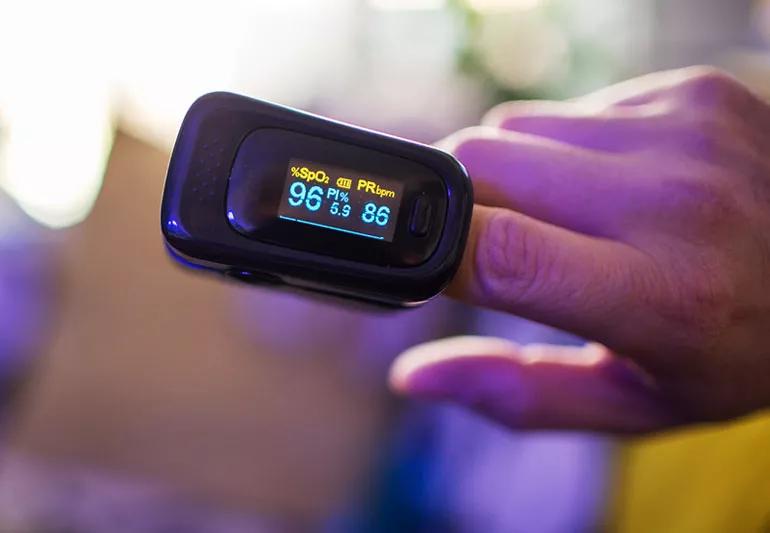Keeping tabs on coronavirus symptoms

First, it was hand sanitizer and disinfectant wipes. The latest item flying off the shelves in response to the 2019 novel coronavirus? The pulse oximeter, a medical device that clips to your finger to measure the amount of oxygen in your blood.
Advertisement
Cleveland Clinic is a non-profit academic medical center. Advertising on our site helps support our mission. We do not endorse non-Cleveland Clinic products or services. Policy
But is this something you actually need in your medicine cabinet? The answer is, it depends, says pulmonologist Wayne Tsuang, MD.
He breaks down what a pulse oximeter — or “pulse ox”— can tell you, and whether you might want to get one.
Oxygen is the fuel your body needs to function. Insufficient oxygen in the blood can interfere with the function of the heart and brain.
Doctors have discovered that some people with COVID-19 have dangerously low blood oxygen — even though they don’t feel short of breath.
“We’re seeing reports of ‘silent hypoxia,’ or low oxygen levels in some patients without severe symptoms,” Dr. Tsuang says.
In response to those reports, people have started buying pulse oximeters to keep tabs on their oxygen levels if they get sick.
Advertisement
Pulse oximeters come in a wide variety of styles and price points. Dr. Tsuang recommends buying one from a reputable store or website, such as a pharmacy or medical device supplier.
Some smart watches and fitness trackers also measure blood oxygen saturation. But they might not be as reliable as medical devices, he cautions, so take the numbers with a grain of salt.
What should you be looking for? A healthy oxygen saturation is typically above 90%. If your number dips below 90%, Dr. Tsuang says, call your doctor for advice.
Remember, too, that low oxygen is just one sign of COVID-19. Even if you have a healthy blood oxygen level, don’t ignore other possible symptoms, like cough or shortness of breath.
“The pulse ox is just one piece of data,” says Dr. Tsuang. “If you have any concerns or questions, your doctor will look at all of your symptoms and vital signs to get the whole picture.”
Advertisement
Learn more about our editorial process.
Advertisement

When something like food or drink goes down your windpipe rather than your esophagus, it can cause coughing and sometimes choking

Covering your mouth when you cough and staying home when you’re sick are a couple ways to help keep yourself and others COVID-free

There’s no safe way to find, handle, repair or remove asbestos yourself — it’s always a job for a professional

This vital nutrient supports your health, but its role in COVID-19 prevention and treatment isn’t proven

Mold exposure can cause allergic reactions, asthma and skin rashes

Many claims lack science-backed research, but halotherapy is popular and considered safe

Both are respiratory infections, but bronchitis affects your bronchial tubes, while pneumonia affects the air sacs in your lungs

Breathing in toxic smoke can lead to serious health problems

If you’re feeling short of breath, sleep can be tough — propping yourself up or sleeping on your side may help

If you fear the unknown or find yourself needing reassurance often, you may identify with this attachment style

If you’re looking to boost your gut health, it’s better to get fiber from whole foods